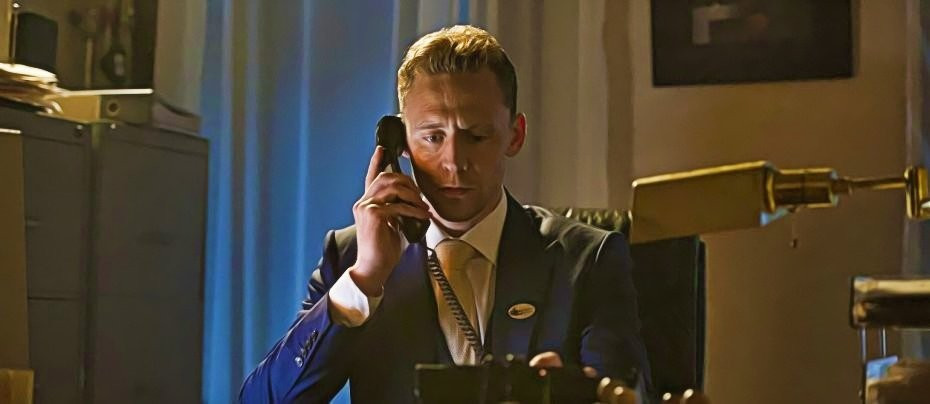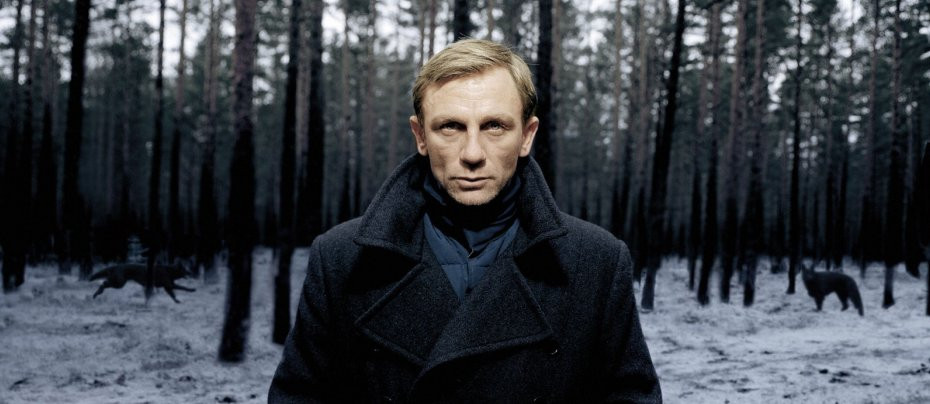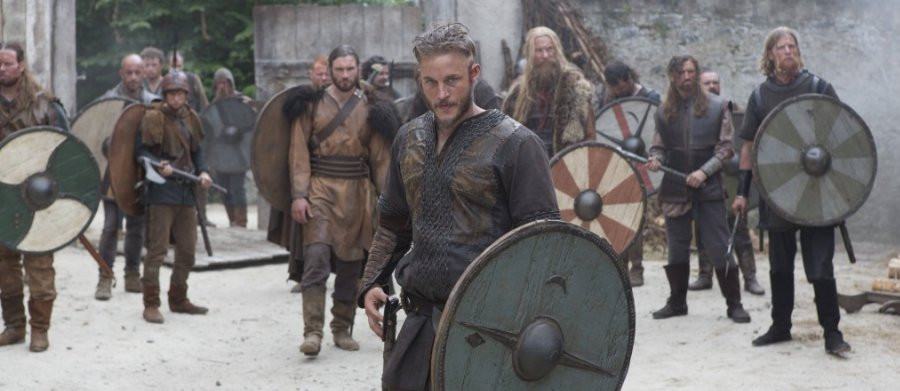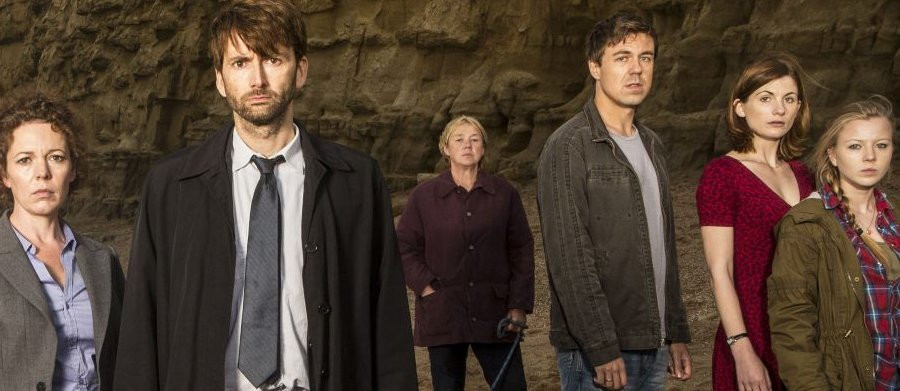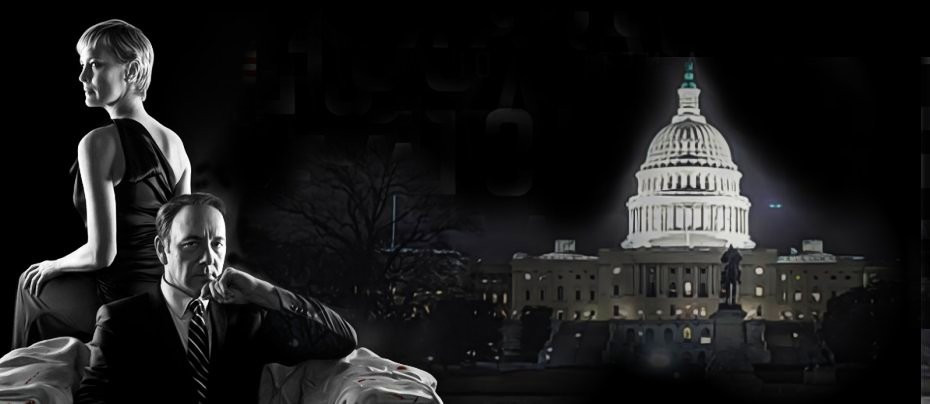
House of Cards (USA)
2013 - United StatesWatching House of Cards in 2022, it is striking how what was meant to be shocking in 2013 now seems rather tame, even touchingly naïve
Review: John Winterson Richards
In retrospect, knowing now how it has transformed television completely, it is perhaps difficult to appreciate just how risky it was for Netflix, a failed postal video rental operation turned streaming service, to start commissioning its own original programming only a few years ago. The American House of Cards was destined to be the first of countless Netflix originals, but few would have dared to predict back then that Netflix would supplant the major networks as the natural home and first stop for those pitching or seeking new shows.
If it was to get its new way of doing things off to the best possible start Netflix needed something classy to set the tone as well as something of proven commercial viability. A remake of a hugely successful BBC political drama met both criteria. It may be no coincidence that their great rivals, Amazon Prime, also chose an upmarket politically themed show to begin their own direct commissioning around the same time, but in Amazon's case it was a comedy, Alpha House.
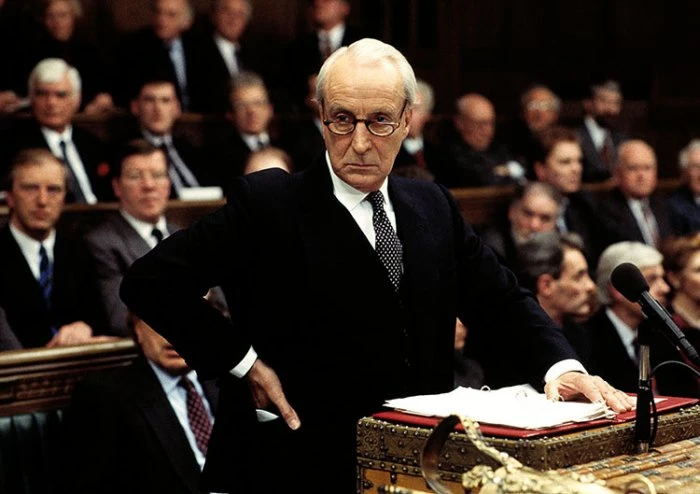
The British House of Cards had an immaculate pedigree, based on a novel by Michael Dobbs, now Lord Dobbs, who had worked for Margaret Thatcher, and scripted by Andrew Davies, the most distinguished adaptor of his generation. It had been a huge commercial and critical hit in the UK, thanks to some fortuitous timing - it came out just as Mrs Thatcher was being forced out of Downing Street - and to a legendary performance by Ian Richardson as its Machiavellian protagonist, Francis Urquhart. His catchphrase, "You might very well think that, I couldn't possibly comment" was immediately on everyone's lips and has been part of British political vocabulary ever since.
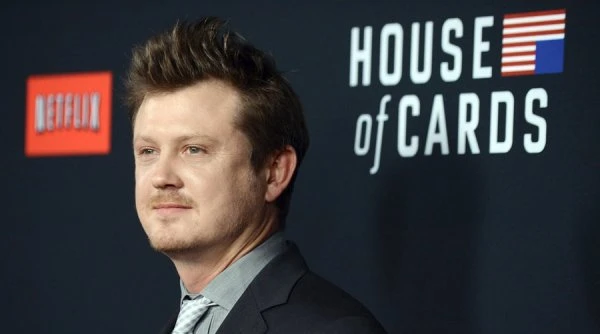
Seeking the same authenticity, Netflix appointed Beau Willimon as "showrunner." Although he was a relatively inexperienced writer for such a position, he had the advantage of having also been active in top division politics, working for Hillary Clinton and other leading Democrats. He had used his inside knowledge as the basis of a play, Farragut North, which had in turn been the basis of a feature film, The Ides of March, starring George Clooney. It is no surprise that this most political of animals has since gone on to become President of the Writers Guild of America West, the scriptwriters' trade union.
One is struck by how much the American and British versions have in common, at least in the beginning. The premise is exactly the same: the chief whip of the ruling party in the lower house of the legislature is known in political circles as a very effective operator, despite being largely unknown to the general public. He keeps his fellow legislators in line with a rod of iron, and his support is crucial the helping a new leader win power. When the new leader proves ungrateful, reneging on a promise of high office, the hitherto loyal whip schemes to replace him. In this he is helped by his equally ambitious wife, his ruthless enforcer, a frightened dupe, and an opportunistic but ultimately naïve young female journalist with Daddy issues.
However, in both versions, our protagonist's only real confidant is the audience. Like Shakespeare's Richard III, he smashes the fourth wall with some very perceptive and beautifully written, if perhaps overly cynical, asides to the camera on the realities of politics and human nature. These are the best parts of both shows and are as quotable as Machiavelli - even if they sometimes suggest that, like Machiavelli, the man spouting all these misanthropic aphorisms is a bit too clever for his own good.
It is also no coincidence that Francis Urquhart and Frank Underwood happen to share the same significant initials.
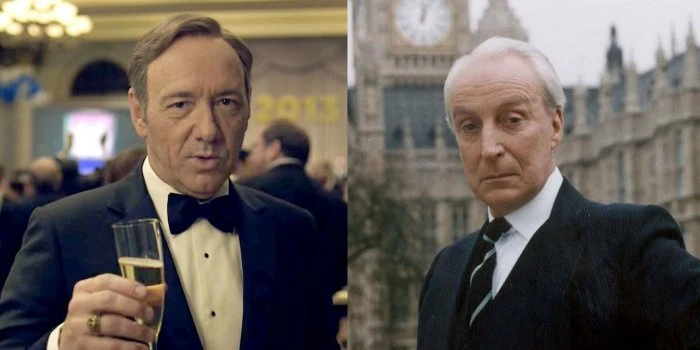
Only very gradually do the differences between the two productions, reflecting the deeper differences between political culture and television norms, become more and more pronounced. The biggest is that in the United Kingdom, the political system is more centralised, so the focus of the struggle for power is almost exclusively on Downing Street. In the United States, it is more like multidimensional chess as Congress, the courts, the media, big business, the unions, powerful Washington lobbyists, and the military all play more active and autonomous roles. If the episode in which rich businessmen gather for the weekend for strange rituals in a forest seems an absurd intrusion of conspiracy theory, it is actually a reference to the real life Bohemian Grove, a retreat in Northern California to which Ronald Reagan often refers affectionately in his private correspondence.
That America's political culture offers more opportunities is also helpful in dealing with the big structural difference between the British and American versions. The British original was a "miniseries" of just under four hours, followed by two sequels based on separate novels, where the American remake is a single ongoing story totalling 73 episodes over six seasons.
This means a lot more plot is required. The first season basically exhausted the material from the initial Dobbs novel and the first Davies "miniseries." The subsequent novels and British "miniseries" offered little useable raw material to Willimon and his team: Urquhart's relationship with the Royal Family and the legacy of his military service in Cyprus were major storylines - not exactly relevant to the American market.
As a result, there is greater emphasis in subsequent seasons on subplots involving supporting characters, most of which are by no means as interesting as the machinations of Underwood himself. There is also more on the Underwoods' louche personal lives which rather undermines their image as single-minded fanatics subordinating everything to their quest for power.
Where Urquhart's rise to power comes across as more or less unstoppable, in accordance with the tight structure of the "miniseries," it is dramatically necessary for Underwood to face more obstacles and setbacks. Some of these are his own fault. He has more flaws than the highly disciplined Urquhart. He loses control of his emotions at crucial moments. He makes unforced errors Urquhart would never have made. His weaknesses make him a less impressive protagonist and therefore detract from the drama at times.
For all the credibility that Willimon's political experience gives the scripts, there are two respects in which authenticity takes a back seat to dramatic necessity. Darwinian principles apply mercilessly in politics and those who reach the top divisions do so because they have learnt to keep a tight grip on their emotions. There are well publicised exceptions but they are well publicised precisely because they are exceptional. However, television requires that feelings be visible - and they cannot be as subtle as they can on the big screen. So there is altogether too much drama in and around the White House for it to feel entirely realistic.
The second lapse in authenticity might surprise many people: career politicians do not lie as much as they do in House of Cards. This may be due to integrity or to a general assumption that it shows a lack of professional skill to be caught telling a direct lie, but, either way, a politician who gets the reputation of being a compulsive liar cannot last long. In House of Cards, most characters seem to revel in telling obvious and unnecessary untruths that are easy to check. It is almost as if they are asking to be found out. In reality no one would believe anything any of these people ever said. It is worth noting that Machiavelli himself only had a very short political career and his later attempts to get back in were met with polite rebuffs because no one trusted him.
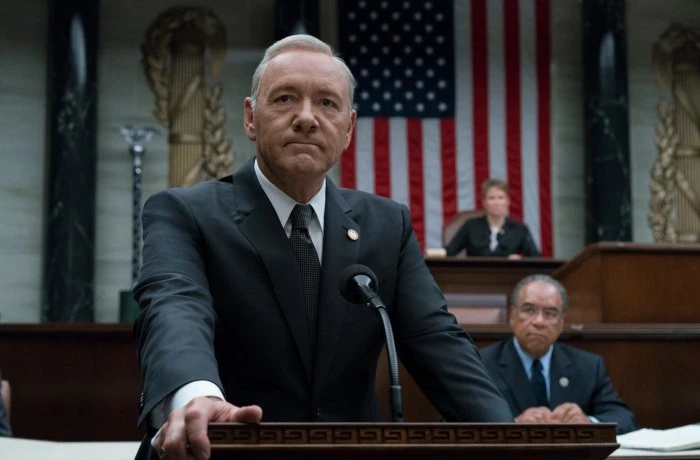
So Underwood is not really the effective operator he is presented to be. Once he achieves the power he seeks, he actually proves surprisingly incompetent at first. Having spent his whole life in pursuit of something, he has no idea what to do with it when he finally gets it. The third season is therefore something of a disappointment. Yet this provokes a situation which puts him on the back foot, and Underwood is at his best under pressure, in terms of both politics and entertainment.
There may be another culture difference at work in how viewers are supposed to react to the unsympathetic protagonist. Cynical Brits rather enjoyed seeing the vulpine Urquhart using his cunning to get out of one trap after another - at least in the "miniseries:" the novels kept trying to give him a comeuppance. Americans are perhaps a more moralistic people and want to believe that their system works. Off screen factors prevented Underwood ever being held accountable on screen, but he is never allowed to enjoy the fruits of victory as Urquhart did.
Watching House of Cards in 2022, it is striking how what was meant to be shocking in 2013 and in the early seasons now seems rather tame, even touchingly naïve, given the tectonic shifts in the American and global political landscape since then. Strange to think that only a few years ago impeachment was still considered a big deal, and the United States assumed it was all powerful in the world, even if the warning signs were already visible.
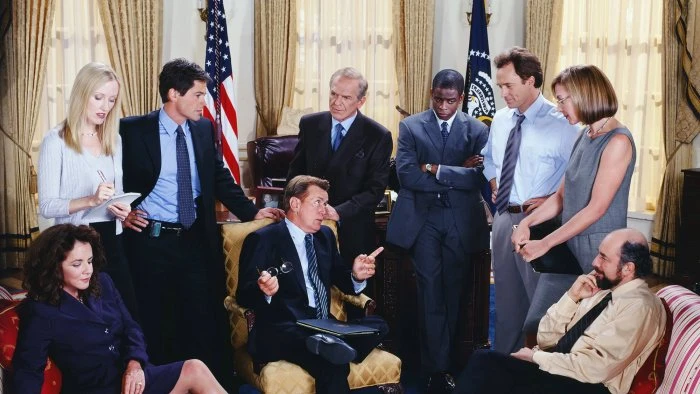
To their great credit, Willimon and his fellow writers - who, presumably, like nearly all writers with viable Hollywood careers now, come from the same side of the spectrum - are restrained in forcing their political views on the audience. House of Cards is a great improvement on The West Wing in this respect. While a definite anti-Trump subtext can be read into the later seasons, it is kept as a subtext, which is actually more effective than trying to preach at the viewer. It has to be said that the writers seem to have little understanding of how people on the other side think, so the Republican characters come across as a bit cardboard, but neither do they give the Democrats a free ride. The House Democrats are portrayed as naïve idealists or in thrall to special interests or both. Underwood is not a lone psychopath but the product of a machine that favours men like him.
Overall, the writing suffers from the Law of Diminishing Returns. The first season, which follows its British source material closely, is the best but the second, more distinctively American, is almost as good. After a bit of a lapse in the third, the story gets a couple of strong adrenaline shots in the fourth that carry it on through the fifth.
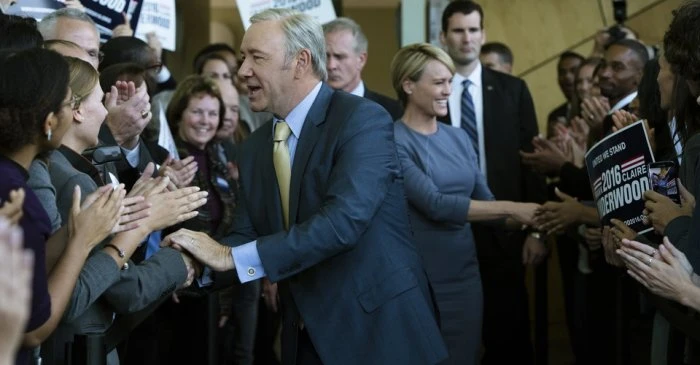
The sixth season is simply bad. The departure of star Kevin Spacey, who plays Underwood, was a major blow but there was also a marked decline in the writing at the same time. Willimon had already left and his sophisticated political drama became a second rate murder mystery. It had its good moments, but too many story points were ridiculous, the motivations of previously intelligent characters became incoherent, and constant references to the departed Underwood simply drew attention to the Spacey shaped hole. So did some very heavy handed feminism that came across as a deferential nod in the direction of the "Me Too" movement in the wake of Spacey's ignominious exit. The actual ending of the last season was so abrupt that it seemed no one was even trying any more.
It was indeed 'Hamlet' without the Prince. While Spacey was not quite the whole show, he was what made it memorable. Whatever one might say about the man, the actor is never less than fascinating. Like Richardson he has the gift of making evil strangely attractive, but he is given far more time than Richardson to develop his character and he uses it well. Although there are no great depths to Underwood, and we never get to like him, we do get to understand a lot about him and why he is as he is, which we never do with Urquhart. It is one of the great television performances of all time by one of the great actors of his generation. It is worth noting that both Richardson and Spacey had previously played Richard III on stage to great acclaim.
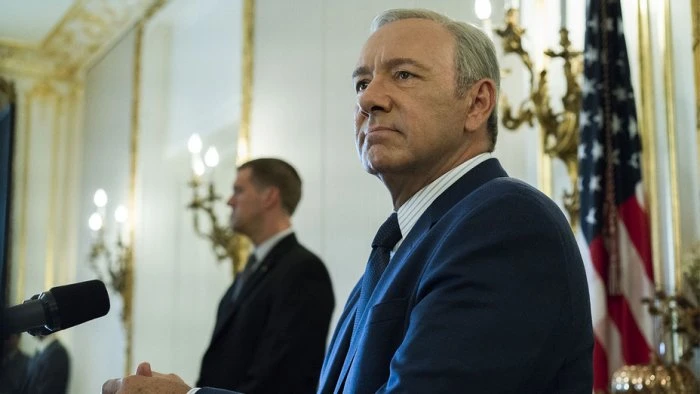
The quality of Spacey's performance does drop off a bit with the writing as Underwood becomes more and more of a straight villain in his later seasons, a pastiche of the popular image of Richard Nixon. It might be significant that Spacey played Nixon in the feature film Elvis & Nixon at the same time he was making House of Cards. One can sense more of a Nixonian tone to Underwood in the later episodes. Whether this is strictly fair to Nixon may be debatable. Either way, whether as Underwood or Nixon, Spacey is always compelling.
He was dropped unceremoniously from the show after allegations of sexual abuse as part of "Me Too," and Netflix announced promptly and rather brutally that they were severing all connections with him. Around the same time it was announced that the scheduled sixth season, in which he had been due to appear but which had not started filming, would be the last. In spite of the constant use of his name, Underwood's face is never seen in the final season and his voice is never heard - to the ludicrous extent that his face is cropped from photographs and characters listen to him giving important story points only on headphones. Spacey suddenly became a complete "unperson" in his own show.
It must be stressed that the allegations against him were indeed very serious, and the general impression that emerged was rather unsavoury, but he was never convicted of anything and at the time of writing there are no ongoing investigations in the public domain. It therefore seems rather odd that it was the producers who sued him for breach of contract and were awarded over $30,000,000 in damages.
The extent to which Spacey's dismissal was a reflection of real public demand rather than corporate politics seems uncertain. Fans of the show usually express regret at his absence and it was commercially less successful without him.
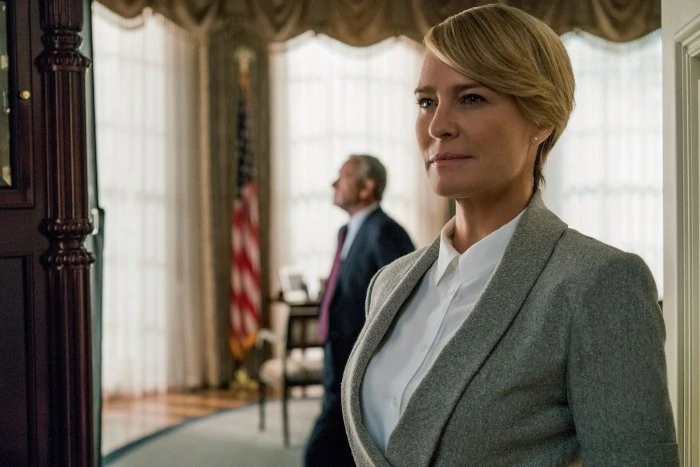
Robin Wright, playing Underwood's wife Claire, stepped up very effectively to take the lead in the final season and she was the best thing in it. She had indeed been a worthy partner to Spacey throughout and her character had become increasingly important as the seasons progressed. It is no disrespect to Wright's authoritative performance that the writers, especially in the later seasons, never really make up their minds what they want the viewer to think about Claire. Is she Underwood's co-conspirator or a victim of his bullying trying to assert herself? An attempt to reinvent her as a feminist heroine in the final season rather ignores what has gone before: while comparison with Lady Macbeth is an exaggeration - Frank never needed anyone to urge him on - they were a believable partnership in the early seasons when both characters were at their strongest. Later conflict between them seems a bit forced.
Michael Kelly makes a powerful impression as Underwood's tightly wrapped Chief of Staff, in effect the third member of the Underwood triumvirate, his almost pathological loyalty to Frank being the defining feature of his life. He even manages to emerge with some credit from that disastrous final season.
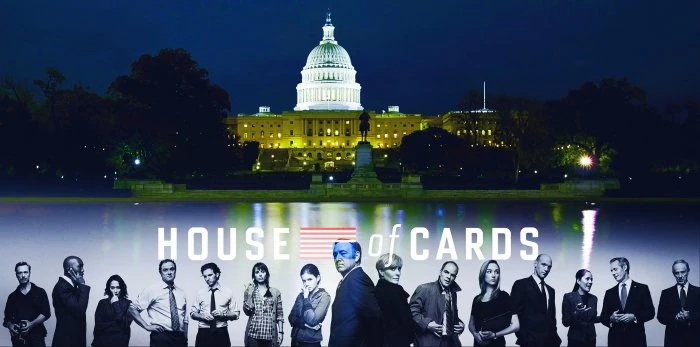
Those who stand out in a very, very strong supporting and guest cast include Kate Mara as the young journalist out of her depth, Boris McGiver as a respected newspaper editor, Corey Stoll as a weak minded Congressman exploited mercilessly by Underwood, Gerald McRaney as a powerful businessman not a million miles from his George Hearst in Deadwood, Patricia Clarkson as a trade negotiator with suspiciously good international connections who seems to be running her own foreign policy, Elizabeth Marvel as a zealous prosecutor who finds her own ethics tested, Joel Kinnaman as a too-good-to-be-true Republican contender and Dominique McElligott as the perfect wife who begins to see that he is not that good after all, Kim Dickens as a rather underused journalist, Jayne Atkinson as a convincingly Madeleine Albright-esque Secretary of State, Campbell Scott as a Republican fixer turned unlikely Democratic grandee, Mahershala Ali as a lobbyist with too many qualms for someone in his line of work, Diane Lane and Greg Kinnear as wealthy siblings with a political agenda, Neve Campbell as a Texan political consultant who thinks she is ready for the big time, and Jimmi Simpson, a hacker being blackmailed by the FBI, whose guinea pig Cashew has been described as "the only character worth caring about" on the show.
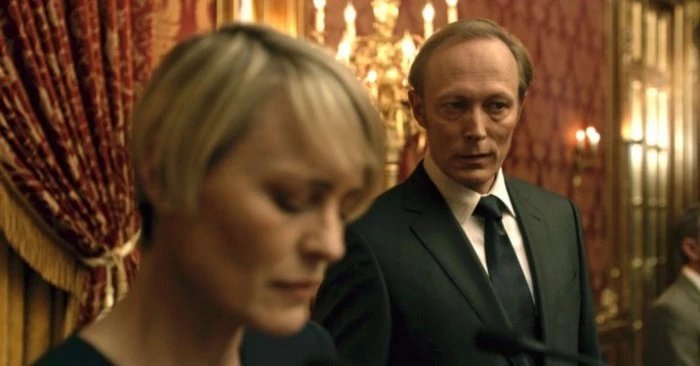
Best of all is Lars Mikkelsen - so good in The Killing and The Witcher - who steals every episode in which he appears as a domineering Russian President with the initials VP. President Petrov is gregarious and likes a drink, unlike a certain real life Russian President, but, as Mikkelsen, a singularly intelligent actor, observed, said real life Russian President usually forms a "nice cop, nasty cop" double act with a more convivial subordinate. What Mikkelsen does in effect is play both sides of the double act in one person. It is a glorious performance, entertaining and thought provoking. One sees how an old fashioned bully can be very effective on the world stage. Petrov could really carry his own show if anyone ever wants a "spin off."
Netflix invested in a hugely talented team of directors, including David Fincher, Joel Schumacher, James Foley, Alik Sakharov, Roxanne Dawson, Jodie Foster, Daniel Minahan, and Robin Wright herself - the actress started directing on the show and turned out to be so good at it that she ended up directing no less than ten episodes, including a couple of the best of them. She has since gone on to direct outstanding episodes of Ozark, a show in which she does not appear, by invitation. Princess Buttercup has grown up.
The show excelled at making relatively little money go a long way, evoking the glamour of the Presidency on a television budget, even if you can see some of the economies if you are looking closely for them. Most of the location work was done in Maryland, the State that borders on Washington DC: it looks similar but it is cheaper to film there and there are fewer restrictions than in the security conscious Capital. The sound stages were also in Maryland - as it happens in a town mentioned in the script, Joppa. The set for the Residence within the White House looks particularly impressive - especially since the White House itself is a surprisingly small building relative to its significance.
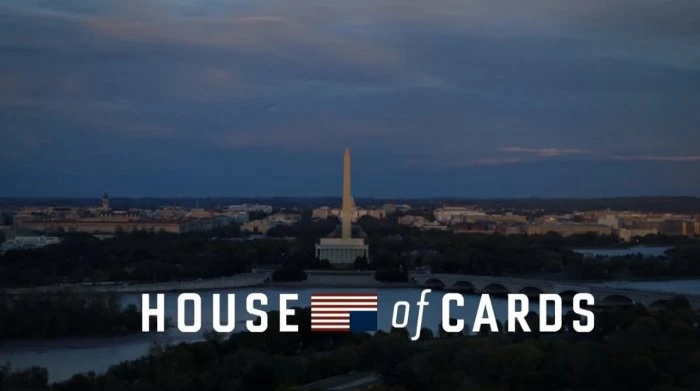
The opening titles sequence, a cityscape of Washington itself over the course of a day, is a minor masterpiece in its own right, emphasising its grandeur but also how impersonal it is. Unusually these days, the sequence remained practically unchanged for all six seasons, except for a "blink and you will miss it" insert in the very last episode.
As with Game of Thrones, the understandable anger directed at that last episode should not be allowed to obscure the great work done in the previous seasons or the importance of House of Cards in the history of the television business.
It is still worth watching today as a very high quality drama, even if some aspects of the politics already seem dated, but the best advice is to stop at the end of the fifth season. If it seems incomplete at that point, be warned that it will seem even more so at the end of the sixth, and at least leaving it at the same time as Spacey means one can avoid having to watch it ruin its own legacy.
Seen this show? How do you rate it?
Seen this show? How do you rate it?
Published on February 16th, 2022. Written by John Winterson Richards for Television Heaven.


